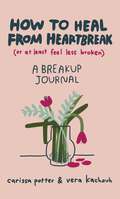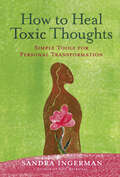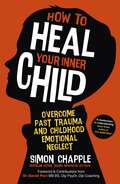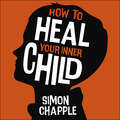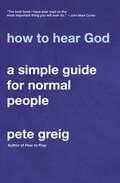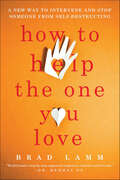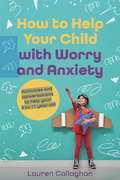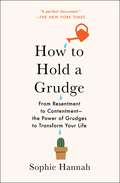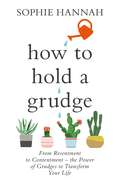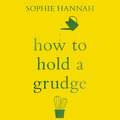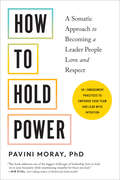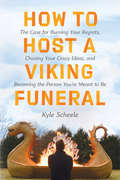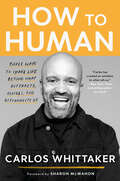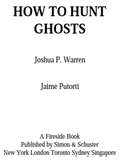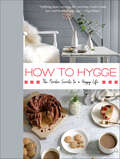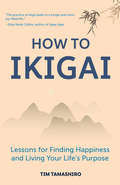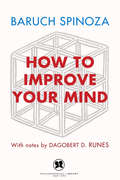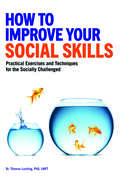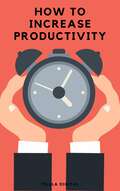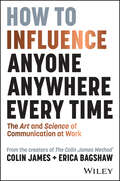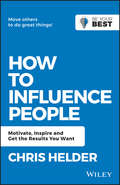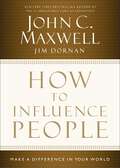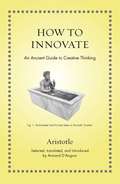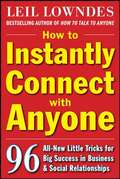- Table View
- List View
How to Heal from Heartbreak (or at Least Feel Less Broken): A Break-up Journal
by Carissa Potter Vera KachouhA guide, friend and judgement-free zone to help process the journey of heartbreakBreakups are messy. They're emotional. They're raw. But all of that pain doesn't go away after the initial break. It sticks around - sometimes for a long time, sometimes forever - like grief. Whether you were the dumper or the dumpee, if you were together for four months or four years, going from a 'we' to a 'me' is not simple.This journal is the non-judgmental friend you can share all of your feelings with. With questions that hit all of the stages, from shock and anger all the way to sort-of-acceptance, you will learn more about yourself and what you want in a relationship. And most important, you will learn that the love you gave was never - and will never be - a waste.
How to Heal Toxic Thoughts: Simple Tools for Personal Transformation
by Sandra Ingerman“Ingerman’s creative, multi-pronged plan for healing is gentle, practical and encouraging, making it a fine resource for the overstressed.” —Publishers WeeklyWe may not realize it consciously, but negative feelings can be as toxic as physical poisons, wearing on us and causing depression, illness, and burnout. But how can we keep ourselves safe in a world too often ruled by resentment, jealousy, rage, and stress? How to Heal Toxic Thoughts provides the cure, and it lies in the ancient principle of alchemy. Many people think that the old alchemists were trying to turn lead into gold. But in actuality, as Sandra Ingerman—a practicing shaman and psychologist—reveals, they were metaphorically working on transforming heavy leaded consciousness into gold light consciousness. Using their theories, Ingerman offers strategies for processing the harmful thoughts and emotions that hit us throughout our day. Instead of sending and receiving lethal energy, you will learn, through meditations, visualizations, and other exercises, how to radiate positive thoughts and shield yourself from those that are destructive. Her methods are simple . . . but they can change you, others, and the world.“This wonderful little book, filled with healing stories and wisdom, will change people’s lives. Sandra Ingerman is to be commended for she has created very good medicine indeed.” —Hank Wesselman, PhD, and Jill Kuykendall, RPT, authors of Spirit Medicine“If you sincerely want a more healthy, compassionate approach to life’s challenging moments, this book can help enormously. How to Heal Toxic Thoughts is like a weeklong retreat delivered in an easy-to-follow format.” —Leonard Felder, PhD, author of Keeping Your Heart Open
How to Heal Your Inner Child: Overcome Past Trauma and Childhood Emotional Neglect
by Simon Chapple'A masterclass in understanding' ANNIE GRACE, author of This Naked MindTen questions to ask yourself, right now:* Do you have a sense that something is wrong, but you don't know what it is?* Do you have a feeling that you are hollow inside, that you are empty or have a void within?* Do you react badly to rejection?* Do you often feel sad, unhappy or down for no obvious reason?* Would you describe yourself as highly sensitive?* Do you have problems with relationships and intimacy?* Do you engage in addictive behaviour - alcohol, drugs, gambling, shopping, food, sex, work, exercise?* Do you have low self-esteem or self-worth - are you not 'good enough'?* Do you have a sense of being numb to your feelings?* Do you rarely experience true joy and happiness?If you have answered 'yes' to most of these questions, there is a strong chance you have experienced emotional neglect or trauma as a child. An emotionally neglected child may struggle to form strong and secure attachments as an adult. They may feel hollow or empty, worthless (or overly important), judge themselves harshly and struggle with addictive tendencies - drinking, eating or exercising too much, for example. If this describes you, Heal Your Inner Child will change your life and give you back the love, compassion and authenticity you needed as a child, and deserve as an adult.Fomer heavy drinker turned sobriety coach Simon Chapple is - like you - a survivor of childhood trauma. His unique brand of straight-talking, practical yet reflective and relatable advice has helped thousands of people quit drinking, and he can help you now to move on from childhood emotional neglect to a place of happiness free from past trauma. How to Heal Your Inner Child is a stepped and safe approach to confronting your past, with space for reflective and supportive strategies that will help you to foster self-compassion and break free from the destructive behaviours that have blighted your life. Clinically endorsed and verified by a psychotherapist, this deeply personal, unflinchingly honest exploration is designed to unlock your own epiphany and support you as you journey to a happier, less troubled and more authentic self.
How to Heal Your Inner Child: Overcome Past Trauma and Childhood Emotional Neglect
by Simon Chapple'A masterclass in understanding' ANNIE GRACE, author of This Naked MindTen questions to ask yourself, right now:* Do you have a sense that something is wrong, but you don't know what it is?* Do you have a feeling that you are hollow inside, that you are empty or have a void within?* Do you react badly to rejection?* Do you often feel sad, unhappy or down for no obvious reason?* Would you describe yourself as highly sensitive?* Do you have problems with relationships and intimacy?* Do you engage in addictive behaviour - alcohol, drugs, gambling, shopping, food, sex, work, exercise?* Do you have low self-esteem or self-worth - are you not 'good enough'?* Do you have a sense of being numb to your feelings?* Do you rarely experience true joy and happiness?If you have answered 'yes' to most of these questions, there is a strong chance you have experienced emotional neglect or trauma as a child. An emotionally neglected child may struggle to form strong and secure attachments as an adult. They may feel hollow or empty, worthless (or overly important), judge themselves harshly and struggle with addictive tendencies - drinking, eating or exercising too much, for example. If this describes you, Heal Your Inner Child will change your life and give you back the love, compassion and authenticity you needed as a child, and deserve as an adult.Fomer heavy drinker turned sobriety coach Simon Chapple is - like you - a survivor of childhood trauma. His unique brand of straight-talking, practical yet reflective and relatable advice has helped thousands of people quit drinking, and he can help you now to move on from childhood emotional neglect to a place of happiness free from past trauma. How to Heal Your Inner Child is a stepped and safe approach to confronting your past, with space for reflective and supportive strategies that will help you to foster self-compassion and break free from the destructive behaviours that have blighted your life. Clinically endorsed and verified by a psychotherapist, this deeply personal, unflinchingly honest exploration is designed to unlock your own epiphany and support you as you journey to a happier, less troubled and more authentic self.
How to Heal Your Inner Child: Overcome Past Trauma and Childhood Emotional Neglect
by Simon Chapple'A masterclass in understanding' ANNIE GRACE, author of This Naked Mind: Control Alcohol, Find Freedom, Discover Happiness and Change Your LifeA recovery and growth handbook for anyone who feels empty - but doesn't know why.Ten questions to ask yourself, right now:* Do you have a sense that something is wrong, but you don't know what it is?* Do you have a feeling that you are hollow inside, that you are empty or have a void within?* Do you react badly to rejection?* Do you often feel sad, unhappy or down for no obvious reason?* Would you describe yourself as highly sensitive?* Do you have problems with relationships and intimacy?* Do you engage in addictive behaviour - alcohol, drugs, gambling, shopping, food, sex, work, exercise?* Do you have low self-esteem or self-worth - are you not 'good enough'?* Do you have a sense of being numb to your feelings?* Do you rarely experience true joy and happiness?If you have answered 'yes' to most of these questions, there is a strong chance you have experienced emotional neglect or trauma as a child. An emotionally neglected child may struggle to form strong and secure attachments as an adult. They may feel hollow or empty, worthless (or overly important), judge themselves harshly and struggle with addictive tendencies - drinking, eating or exercising too much, for example. If this describes you, Heal Your Inner Child will change your life and give you back the love, compassion and authenticity you needed as a child, and deserve as an adult.Fomer heavy drinker turned sobriety coach Simon Chapple is - like you - a survivor of childhood trauma. His unique brand of straight-talking, practical yet reflective and relatable advice has helped thousands of people quit drinking, and he can help you now to move on from childhood emotional neglect to a place of happiness free from past trauma. How to Heal Your Inner Child is a stepped and safe approach to confronting your past, with space for reflective and supportive strategies that will help you to foster self-compassion and break free from the destructive behaviours that have blighted your life. Clinically endorsed and verified by a psychotherapist, this deeply personal, unflinchingly honest exploration is designed to unlock your own epiphany and support you as you journey to a happier, less troubled and more authentic self.(P) 2021 Hodder & Stoughton Limited
How to Hear God: A Simple Guide for Normal People
by Pete GreigNothing could possibly matter more than learning to discern the authentic voice of God, but few things in life are more susceptible to delusion, deception, and downright abuse. When life falls apart and we need God's comfort; in moments of cultural turmoil when we need his clarity; facing formidable decisions when we need his guidance; desiring a deeper faith when we need God to say something, anything, to turn the monologue we call prayer into a genuine conversation.Having addressed God's silence in God on Mute, and then How to Pray in his previous bestseller, Pete Greig is back to bring wisdom and guidance to one of the most pressing and perplexing aspects of universal Christian experience--How to Hear God. Exploring the story of Christ's playful, poignant conversation on the road to Emmaus, Pete draws deeply from the insights of a wide range of Christian traditions. He weaves together the evangelical emphasis upon hearing God in the Bible, and the charismatic commitment to hearing God in the prophetic, with the contemplative understanding of God's "still, small voice" within.
How to Help the One You Love: A New Way to Intervene and Stop Someone from Self-Destructing
by Brad Lamm"As a thorough guide to helping substance abusers find help, this makes a valuable addition to the self-help shelves."—PublishersWeekly (starred review)A powerful, groundbreaking book that shows you, in concrete steps, how to help a loved one stop from engaging in self-destructive behavior. Is your husband drinking himself to death? Is your brother losing it all to gambling? Do you need to get your kid off drugs before it's too late? Or make your spendthrift sister stop maxing out her credit cards? Get your best friend out of an abusive relationship? If you're tired of watching your spouse, child, relative, or friend go downhill, dragging you with them, How to Help the One You Love will help you turn their lives around. You don't have to endure behavior that is unhealthy, abusive, or even deadly. You can break down the great myths around change—and help them change for good.Many books will tell you that you can't change anyone. They advise you to not even try. But they ignore the tremendous power you actually have to change people. If most books about change are written for the person in trouble, How to Help the One You Love reaches out to the loved ones: people who know that change is critical and urgent. How to Help the One You Love is not just a self-help book; it's a help-you-act book."Brad Lamm's book is a must-read for those seeking help!"—Nancy Grace, host of the Nancy Grace show on CNN
How to Help Your Child with Worry and Anxiety: Activities and Conversations for Parents to Help Their 4-11-Year-Old
by Lauren CallaghanAs a parent, it’s heart-breaking watching your child struggle with anxious thoughts, or seem constantly worried about something. Anxiety is sadly common in children, and can affect their sleep, mood and general wellbeing.How to Help your Child with Worry and Anxiety is a must-read handbook for parents of children aged 4-11 years old who experience anxiety. Clinical psychologist Dr Lauren Callaghan provides you with concise and accessible information, explaining how anxiety works in children, and what you can do to help. You will be shown how to help your child overcome this spiral of anxious thoughts and learn to manage their thoughts and feelings.Dr Callaghan explains clinically proven strategies to help your child to recognise and process anxious thoughts, including scripts to steer a conversation, and activities designed to help your child explore their worries and give them the emotional skills to feel less anxious.
How to Hold a Grudge: From Resentment to Contentment—The Power of Grudges to Transform Your Life
by Sophie HannahThe first and only comprehensive examination of the universal but widely misunderstood practice of grudge-holding that will show you how to use grudges to be your happiest, most optimistic, and most forgiving self. Secretly, we all hold grudges, but most of us probably think we shouldn’t, and many of us deny that we do. To bear a grudge is too negative, right? Shouldn’t we just forgive and move on? Wrong, says self-appointed grudge guru Sophie Hannah, in her groundbreaking and irreverent self-help guide. Yes, it’s essential to think positively if we want to live happy lives, but even more crucial is how we get to the positive. Denying our negative emotions and experiences is likely to lead only to more pain, conflict, and stress. What if our grudges are good for us? What if we could embrace them, and use them to help ourselves and others, instead of feeling ashamed of our inability to banish negative emotions and memories from our lives? With contributions from expert psychotherapists as well as extracts from her own extensive catalog of grudges, Sophie Hannah investigates the psychological origins of grudges and also offers not-so-obvious insights into how we should acknowledge—and embrace—them in order to improve the quality of our interpersonal relationships and senses of self. Grudges do not have to fill us with hate or make us toxic, bitter, and miserable. If we approach the practice of grudge-holding in an enlightened way, it will do the opposite—we will become more forgiving. Practical, compassionate, and downright funny, How to Hold a Grudge reveals everything we need to know about the many different forms of grudge, the difference between a grudge and not-a-grudge (not as obvious as it seems), when we should let a grudge go, and how to honor a grudge and distill lessons from it that will turn us into better, happier people—for our own benefit and for the sake of spreading good and limiting harm in the world.
How to Hold a Grudge: From Resentment to Contentment - the Power of Grudges to Transform Your Life
by Sophie HannahA TIME must-read book of 2019'Hannah is excellent on how to embrace our grudges, nurture them and use them to become a better person' GraziaWhat if grudges are not just good for us but great?How often have you held a grudge and felt guilty about it? 'Forgive and move on' is the received wisdom, and that's what many of us try to do. Positive thinking is essential for a happy life, but how we get to that positive is even more crucial. What if grudges can ward off danger, and help us live better lives?What if they can act as stepping stones, pointing us in the right direction? This ultimate guide will give you all the tools you need to analyse, process and embrace your grudges in order to be your best possible self.** How to Hold a Grudge - The Podcast now available for download! Check out Grudge of the Week, and discover the latest Grudge Music **
How to Hold a Grudge: From Resentment to Contentment - the Power of Grudges to Transform Your Life
by Sophie Hannah'Hannah is entertaining company and the book is even more amusing...' The Times'Hannah is excellent on how to embrace our grudges, nurture them and use them to become a better person' GraziaWhat if grudges are not just good for us but great?How often have you held a grudge and felt guilty about it? 'Forgive and move on' is the received wisdom, and that's what many of us try to do. Positive thinking is essential for a happy life, but how we get to that positive is even more crucial. What if grudges can ward off danger, and help us live better lives?What if they can act as stepping stones, pointing us in the right direction? This ultimate guide will give you all the tools you need to analyse, process and embrace your grudges in order to be your best possible self.** How to Hold a Grudge - The Podcast now available for download! Check out Grudge of the Week, and discover the latest Grudge Music **(P)2018 Hodder & Stoughton Limited
How to Hold Power: A Somatic Approach to Becoming a Leader People Love and Respect--30+ embodiment practices to empower your team and lead with intention
by Pavini MorayEssential skills for today's leaders: learn how to embody your ethics, earn your team's trust, and dismantle toxic work cultureLeaders and managers everywhere are learning the importance of creating safe, satisfying workplaces rooted in principles of social justice. But many of us who try to lead with ethics and integrity struggle with embracing a position of power and authority. You might worry about &“being bossy,&” unintentionally disrespecting others, or making the wrong call—and in the process, put your mind and body under so much stress that you burn out.Somatic educator and coach Pavini Moray argues that the secret to being an ethical, inspirational boss is rooted in our own bodies. In more than 30 simple exercises, reflections, and daily practices, you&’ll learn how to:Nurture trust with clients and coworkersGround and re-center when you&’re thrown off by a mistake or problemSoothe the &“Ouch!&” of negative feedbackBreak away from grind and hustle cultureTurn workplace conflict into a source of positive change and growthHelp your employees voice their own needs and feel heardUnderstand the nuances of consent beyond contract negotiationsGracefully acknowledge mistakesRepair relationships with employees, colleagues, and clientsDrawing from client case studies and their own experience as a manager, Moray teaches foundational embodiment practices—breath, grounding, observing, centering, and moving—through concrete examples that show how to use these skills in a variety of common workplace settings. By learning to practice embodied leadership presence, you can become a boss who truly listens to your employees; leads with inspiration; and brings your whole self to work every day.
How to Host a Viking Funeral: The Case for Burning Your Regrets, Chasing Your Crazy Ideas, and Becoming the Person You're Meant to Be
by Kyle ScheeleAn inspiring speaker and artist asked 20,000 people around the world to share the regrets they wanted him to burn in a mock Viking ship. This is the story of what he learned about letting go of the pain of the past and embracing the future with hope.Turning 30, artist and speaker Kyle Scheele wanted to do something unusual to mark this milestone. Instead of a birthday bash, he decided to hold a funeral to memorialize the decade of his life that was ending. Building a 16-foot Viking ship out of cardboard, he invited friends to help him set it on fire—a symbolic farewell to his 20s and all the grief, regret, and mistakes that accompanied those years. When video of his Viking funeral went viral, it encouraged many others to let go of past hurts as well. Moved by the response he received, Kyle planned a second funeral (this time with a 30-foot cardboard Viking ship) and asked people to share the things they carried—the bad choices, disappointments, heartaches, and negative thinking that they wanted to lay to rest. He received more than 20,000 responses from around the world—stories both heartbreaking and hilarious, painful and inspiring. In this entertaining and wise book, Kyle reflects on what he discovered about freeing ourselves from the pain of the past, interweaving anecdotes from those who participated with the story of his own journey of renewal. “This story involves multiple Viking funerals, thousands of square feet of cardboard, and enough hot glue to supply your mother-in-law's craft night for the rest of time,” he writes. “But it also involves regret, self-doubt, insecurity, and ultimately, redemption. So buckle up. It's about to get bumpy.”How to Host a Viking Funeral is the story of letting go of the people we used to be, but no longer want to be. It’s about renewal; where there was once regret there is now blank space—an opportunity for a fresh start.
How to Human: Three Ways to Share Life Beyond What Distracts, Divides, and Disconnects Us
by Carlos WhittakerA much-needed reminder about what it means to be truly human in a world where people feel increasingly disconnected from each other and from God, by the popular author of Enter Wild.&“Carlos has created an antidote to what ails us.&”—New York Times bestselling author Jon AcuffThese are crazy times, people. We are more agitated than ever. We&’re fighting. Wrestling with big issues. Less connected than ever to one another and to God. It&’s a perfect storm: debilitating anxiety, crashing relationships, and forgetting what it feels like to, well, be human.In How to Human, author, speaker, and social-media personality Carlos Whittaker offers a fresh vision for becoming the best versions of ourselves. We can refuse to let disagreements define us. We can say no to becoming upset, rage-filled humans and say yes to fuller, happier lives. It begins as we make the shift from &“me&” to &“we&” to &“everybody&” in a three-part journey to be human, see fellow humans, and free those around us.You&’ll think, laugh, and be inspired by this practical guide, which reveals how to help others, how to hope fiercely, and how to experience the thrill of being fully human. Carlos describes a radical path of love—one that requires us to become builders rather than demolitionists. One that gets personal. One that moves toward others in faith rather than away in fear. One that, when times get crazy, is willing to get crazier (in a good way). One that understands the big joy of how to human.
How to Hunt Ghosts
by Joshua P. WarrenIn How to Hunt Ghosts, paranormal researcher Joshua P. Warren teaches the novice ghost hunter the basics, which above all include treating the paranormal as any other scientific field: one requiring well-documented research and hard evidence. This unique guide breaks down the theories, explains the tools of the trade, and even offers forms to facilitate your investigation. Peppered with anecdotes from Warren's personal experience, How to Hunt Ghosts offers answers to such questions as: What is a ghost? How does a ghost interact with the world? Where can you find a haunted house? Why do people usually see ghosts at night? How do you record a ghostly encounter? If you suspect you live in a haunted house and want to exorcise a ghost or attempt spectral communication, or if you are interested in pursuing a career as a ghost hunter or are simply curious about the paranormal, this intriguing and informative guide is for you.
How to Hygge: The Nordic Secrets to a Happy Life
by Signe JohansenThe “Danish coziness” philosophy is fast becoming the new “French living” in terms of aspirational lifestyle books and blogs. There are countless viral articles comparing the happiness levels of Americans versus Danes. Their homes are more homey; their people are more cheerful. It’s an attitude that defies definition, but there is a name for this slow-moving, stress-free mindset: hygge (pronounced “hoo-ga”). Hygge values the idea of cherishing yourself: candlelight, bakeries, and dinner with friends; a celebration of experiences over possessions, as well as being kind to yourself and treasuring a sense of community.How to Hygge by chef and author Signe Johansen is a fresh, informative, lighthearted, fully illustrated how-to guide to hygge. It’s a combination of recipes, helpful tips for cozy living at home, and cabin porn: essential elements of living the Danish way—which, incidentally, encourages a daily dose of “healthy hedonism.” Who can resist that?
How to Ikigai: Lessons for Finding Happiness and Living Your Life's Purpose
by Tim TamashiroDiscover your reason to get out of bed in the morning with the ancient Japanese philosophy that &“leads to a longer and more joy-filled life&” (Elise Marie Collins, author of Super Ager). Okinawa, Japan is a tiny, tiny island south of the Japanese mainland where people live their life&’s purpose every day. How is it possible for so many to live each day in such meaningful ways? The Okinawan concept of Ikigai. How to Ikigai describes the lifestyle choices that have led to an island full of fulfilled, long-living people. Examples of Ikigai in action are often magical. Take David Michiels. David stuttered severely well into his adulthood. In clinical terms, his stutter was difficult to treat. But David started to work in a liquor store. Before long, his focus turned to one specific section of the sales floor: the scotch section. As he spent more of his days learning about scotch, he began to share his knowledge with customers. Eventually, David noticed that his stutter vanished when he talked to anyone about scotch. Over time, David&’s passion led to a new life. Today, he is a renowned whiskey expert, traveling the world tasting and purchasing whiskey on behalf of his employer. He feels his life is meaningful because of Ikigai. How to Ikigai explains a simple but abstract map for living a meaningful life. After reading this book, you will understand how to implement Ikigai&’s four directions in your own life: · Do what you love · Do what you&’re good at · Do what the world needs · Do what you can be rewarded for
How to Improve Your Mind
by Baruch SpinozaHow to Improve Your Mind is an engaging philosophical text by master Enlightenment thinker Baruch Spinoza. This edition includes exclusive commentary and biographical notes written by Philosophical Library's founding publisher, Dagobert D. Runes. Baruch Spinoza (1632-1677) is heralded as one of the most influential and radical philosophers of the Enlightenment. An expert on the Talmud and Jewish scriptures, Spinoza is known for his moral philosophy and his views on theology and ethics. He devoted his life to the study of philosophy and Judaism and wrote several philosophical texts throughout his career, including his most extensive and famous tome, Ethics.
How to Improve Your Social Skills: Practical Exercises and Techniques for the Socially Challenged
by Thomas LuckingFrom socially challenged to socially skilled—practical techniques for building social skills Social skills help build relationships, create opportunities in the world, and improve your self-esteem and overall well-being. How to Improve Your Social Skills is filled with research-supported and evidence-based tools and techniques for building your social skills so you're able to approach any scenario with confidence. Whether you're shy, introverted, socially anxious, or have been diagnosed with a disorder that hinders your interactions with others, you'll discover helpful information about tuning into body language, getting comfortable with conversation, and employing different social skills. Discover ways to apply the skills you learn to real-life situations and relationships, like workplace interactions and friendships. How to Improve Your Social Skills includes: Social skill foundations—Learn about what social skills are, why they matter, how to set social goals, and much more. Evidence-based techniques—Explore tools that will help you overcome anxiety and fear, build confidence and self-awareness, and establish assertive and approachable body language. Situational strategies—Put practice to play in real-life scenarios, including dating, group and public settings, and beyond. Feel confident and empowered in any situation with these research-supported techniques and exercises for building social skills.
How to Increase Productivity
by Pílula DigitalThe popular expression "Do more with less" really sums up one of the many challenges of living in modern times. Because, in addition to the country's faltering politics and economy, as always, the impression we have is that - with the advancement of science and technology - the world is getting faster and faster. Now I ask you: faced with such an uncertain scenario, with days getting shorter and businesses more demanding, what can an ordinary person, like you and me, for example, do to stand out in the job market? Prayer might help - someone might ask - but the truth is, if you don't produce more than others - continuously and with better quality, of course! - your future will be forgotten.
How to Influence Anyone, Anywhere, Every Time: The Art and Science of Communication at Work
by Colin James Erica BagshawWe communicate all the time. But do we have impact? Do we influence? When you speak, do people lean in? When they hear you, do others feel impressed, challenged, motivated or inspired? Through tested frameworks and instantly applicable techniques, How to Influence Anyone, Anywhere, Every Time shows you how to use your words and your body language to engage and persuade. With this handbook, you'll learn crucial communication skills for delivering with impact in any professional setting — be it in the boardroom, your next sales meeting or interpersonal interactions. Master how to deliver your message with conviction, confidence and clarity. Globally renowned speaking coaches Colin James and Erica Bagshaw share their proven methodology for wielding influence in any and every context. In How to Influence Anyone, Anywhere, Every Time, they show you how to systematically get and hold people’s attention — and use your influence to achieve positive results in your organisation or business. Whether you’re working face-to-face, you need to create presence online, or you’re crafting a written message, you’ll discover the tips you need. Communicate more effectively with a tried-and-trusted process for success, using the 3 Ds: Diagnose: Who is your audience, what is the context and what is your desired outcome? Design: Get the magic 12 steps that make it easy to tailor your next communication to better engage and influence your audience. Deliver: Don't know what to do with your hands? Learn how to master body language, your voice, visual aids and even your energy for a delivery that will captivate, inspire and persuade even the toughest audience. How to Influence Anyone, Anywhere, Every Time is a must-have resource for anyone who needs to present their ideas, gain trust and bring about real change.
How to Influence People: Motivate, Inspire and Get the Results You Want
by Chris HelderMaster the power of influence and persuasion. What if you could instantly boost your capability to influence, motivate and connect with people? How could it increase your productivity, team culture and bottom line? Better yet, what if you could influence yourself to achieve greater success? Imagine the impact that would have on your life and fortunes.How to Influence People takes these ideas out of the realm of what-if and turns them into reality. Whether you're a new manager looking for direction, an experienced leader looking to hone your skills or a sales professional looking for better ways to connect, How to Influence People is for you! Originally published in 2013 as The Ultimate Book of Influence, this book has been reviewed and redesigned to become part of the Wiley Be Your Best series - aimed at helping readers acheive professional and personal success.
How to Influence People: Make a Difference in Your World
by John Maxwell Jim DornanYou can make a difference! Believe it or not, the most effective way to make an impact on the world is to make an impact on individual people. How do you do that? Through influence. In How to Influence People, leadership guru John C.Maxwell and his friend Jim Dornan tell you how to make a positive impact on every person in your life, from your children and coworkers to your customers and the barista at the coffee shop. How to Influence People will empower you to become a potent and positive influence in the lives of those around you without using a position or title. By "pouring your life into other people" (Dr. Maxwell's definition of mentoring),"you can truly make a difference in their lives." And when you make a difference in the lives of others, it makes a difference in your life too.Learn to perceive the stages of influence in your relationships and skillfully navigate your progress from perfect stranger to helpful confidant, to inspiring mentor and multiplier of influencers. Let this book impact your relationships, great and small, and make you a positive influencer and better leader in the lives of those around you.
How to Innovate: An Ancient Guide to Creative Thinking (Ancient Wisdom for Modern Readers)
by AristotleWhat we can learn about fostering innovation and creative thinking from some of the most inventive people of all times—the ancient GreeksWhen it comes to innovation and creative thinking, we are still catching up with the ancient Greeks. Between 800 and 300 BCE, they changed the world with astonishing inventions—democracy, the alphabet, philosophy, logic, rhetoric, mathematical proof, rational medicine, coins, architectural canons, drama, lifelike sculpture, and competitive athletics. None of this happened by accident. Recognizing the power of the new and trying to understand and promote the conditions that make it possible, the Greeks were the first to write about innovation and even the first to record a word for forging something new. In short, the Greeks “invented” innovation itself—and they still have a great deal to teach us about it.How to Innovate is an engaging and entertaining introduction to key ideas about—and examples of—innovation and creative thinking from ancient Greece. Armand D’Angour provides lively new translations of selections from Aristotle, Diodorus, and Athenaeus, with the original Greek text on facing pages. These writings illuminate and illustrate timeless principles of creating something new—borrowing or adapting existing ideas or things, cross-fertilizing disparate elements, or criticizing and disrupting current conditions.From the true story of Archimedes’s famous “Eureka!” moment, to Aristotle’s thoughts on physical change and political innovation, to accounts of how disruption and competition drove invention in Greek warfare and the visual arts, How to Innovate is filled with valuable insights about how change happens—and how to bring it about.
How to Instantly Connect with Anyone: 96 All-new Little Tricks for Big Success in Relationships
by Leil LowndesHow to connect with anyone gives you 96 tips on how to do just that!
